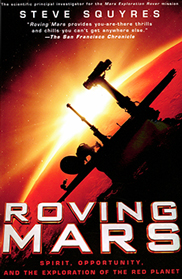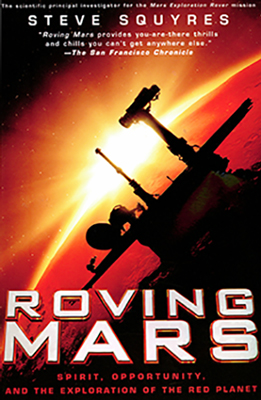Steven W. Squyres is the James A. Weeks Professor of Physical Sciences at Cornell University, and is the Principal Investigator for the science payload on the Mars Exploration Rover Project. He received his Ph.D. from Cornell in 1981 and spent five years as a postdoctoral associate and research scientist at NASA’s Ames Research Center before returning to Cornell as a faculty member. His main areas of scientific interest have been Mars and the moons of the outer planets. Research for which he is best known includes study of the history and distribution of water on Mars and of the possible existence and habitability of a liquid water ocean on Europa.
Dr. Squyres has participated in many of NASA’s planetary exploration missions, including the Voyager mission to Jupiter and Saturn, the Magellan mission to Venus, and the Near Earth Asteroid Rendezvous mission. Along with his current work on MER, he is also a co-investigator on the Mars Express, Mars Reconnaissance Orbiter and Mars Science Laboratory missions, a member of the Gamma-Ray Spectrometer Team for the Mars Odyssey mission, and a member of the imaging team for the Cassini mission to Saturn.
Dr. Squyres chaired the most recent planetary decadal survey for the National Research Council. He has also served as Chair of the NASA Space Science Advisory Committee and the NASA Advisory Council. His awards include the American Astronomical Society’s Harold C. Urey Prize, the Space Science Award of the American Institute of Aeronautics and Astronautics, the American Astronautical Society’s Carl Sagan Award, the National Space Society’s Wernher von Braun Award, and the Benjamin Franklin Medal of the Franklin Institute. He is a fellow of the American Academy of Arts and Sciences.

It's the age-old question: Is there life on Mars Steve Squyres, lead scientist of NASA's Mars Exploration Rover mission, sets out to answer that question and relates his findings in this riveting first-person narrative account. Steve Squyres is the face and voice of NASA's Mars Exploration Rover mission. Squyres dreamed up the mission in 1987, saw it through from conception in 1995 to a successful landing in 2004, and serves as the principal scientist of its $400 million payload. He has gained a rare inside look at what it took for Rovers Spirit and Opportunity to land on the red planet in January 2004 -- has been a key member of the team directing their day-today movement on Mars ever since, and knows firsthand their findings.
Lecture Presented by UC Berkeley Graduate Council
Lecture at the Florida Institute of Human and Machine Cognition - 2012
